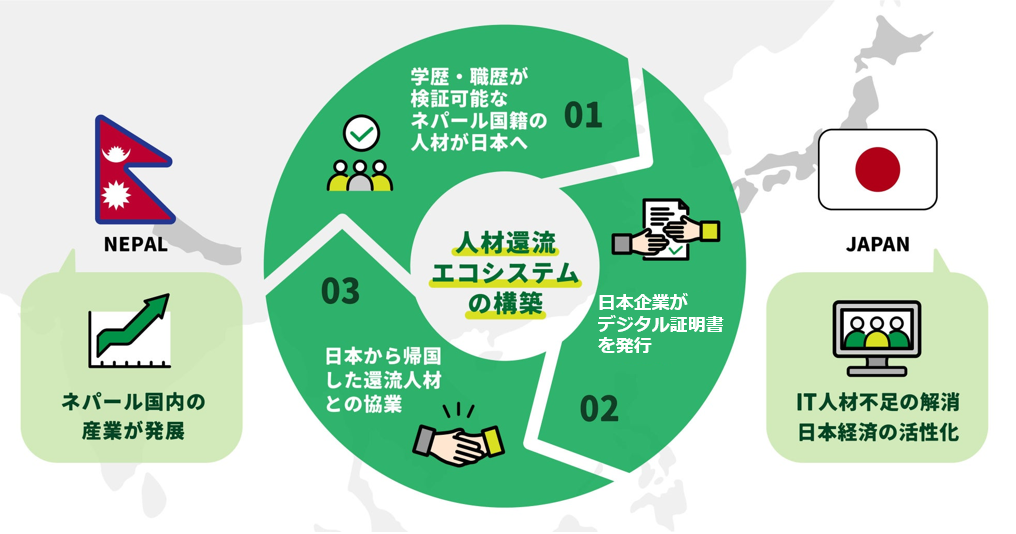Cross-border personal information management platform for the return of foreign talent
2024/06/10Use Cases

This page shows the "Cross-Border Personal Information Management Platform in the Return Flow of Overseas Human Resources" exploried and tested by PitPa, Inc., in the 2023 "Use Case Demonstration Project of the Trusted Web".
Current issues and What Trusted Web Solves
Current Issues (Pain Points)
- Training institutions are unable to verify the effectiveness of education because they are unable to ascertain the work history that their trained talent accumulated while abroad.
- The rapid depreciation of the yen, rising wages for workers in developed countries make overseas recruitment more difficult.
- Foreign talent explains their backgrounds through self-reports such as resumes, but it is difficult to prove their abilities in a highly objective manner.
- When a citizen moves out of their country, the sending country has no medium for recording the history of their activities outside the country. This makes it difficult to ascertain what they have done and will not lead to policy being made.
- Agents (employment support and capability assessment) require significant man-hours to obtain/understand information on talent, increasing the cost of matching and other operations.

What Trusted Web Will Solve
- A system is established to verify and authenticate person’s identity by utilizing certificates issued by each stakeholder as authenticated credentials.
- A personal information distribution system that enables third-party verification even across borders can be formed by issuing a certificate of evaluation and performance to foreign talent in advance from third-party organizations that can verify their academic, professional, and skill history, such as training institutions, host institutions, and other evaluation organizations.
- By certifying career information and increasing transparency in the return flow of foreign talent (before entry into Japan, while in Japan, and after returning home), this will revitalize the recruitment market for foreign talent, which has been less mobile up until now, and furthermore, improve the attractiveness of host institutions issuing certificates, thereby accelerating the mobility of foreign talent.

Data to be verified

Business Validation (including UX/UI) and Implemented Technology
- Interviews and questionnaires were conducted with each stakeholder regarding the needs and usage scenarios for certificates of employment history and Japanese language skills, and the business feasibility study was a particular focus of the project.
Main Achievements
Proof of abilities that are difficult to prove
- By having a trusted third party certify Japanese language skills and career history that are difficult for foreign workers to prove on their own, it is possible to accurately link proof of ability to companies. This has proven to be an effective way to optimize individualized employment support and reduce hiring mismatches.
- On the other hand, there is a need for foreign workers to select only the information that is convenient for them and submit it to companies, and a selective disclosure function is necessary to achieve this, but at present the technology to achieve this has not been selected, which will be a future issue.
Consideration of business models
- It was found that career certificates can be a motivating factor for overseas personnel to work, a decision-making factor for acceptance of employment, and a decision-making factor for referrals. It was also confirmed that there are advantages to issuing the certificate not only for the overseas personnel but also for the companies that accept overseas personnel.
- Future issues include the development of data utilization processes and rule governance for the utilization of certificates on the sending country side. Policy support from the Japanese government and other government agencies will be necessary in seeking continuous dialogue and cooperation with overseas government agencies and educational institutions.
Documents
• summary(Link)
To communicate with Trusted Web stakeholders,
please use the contact form.